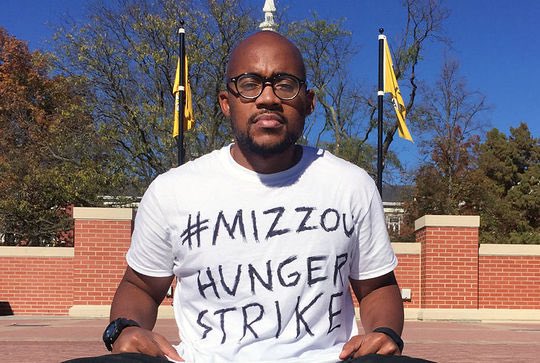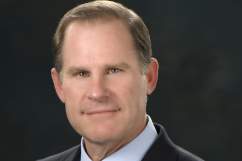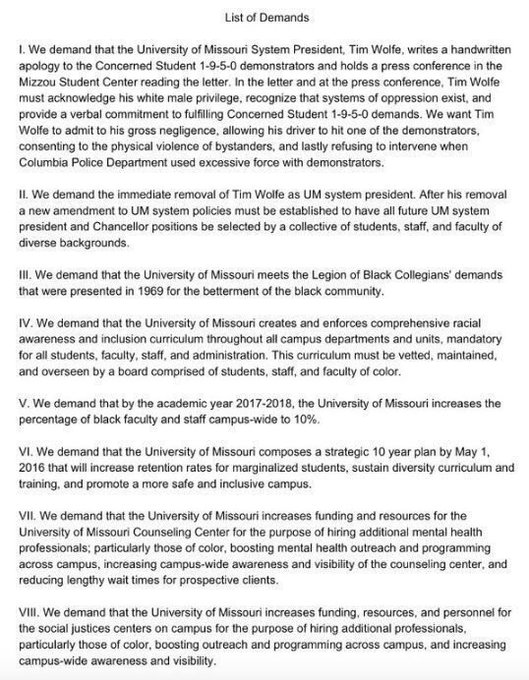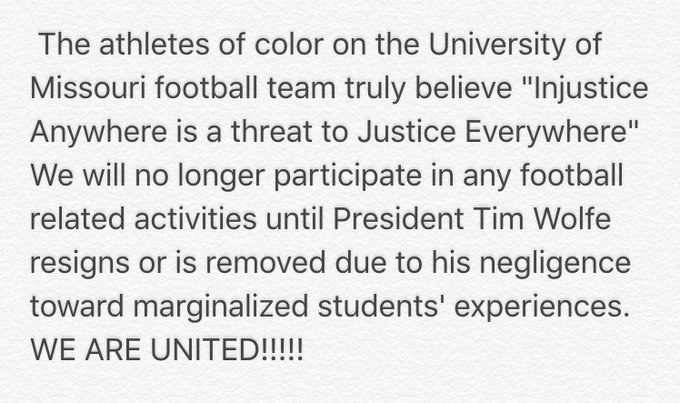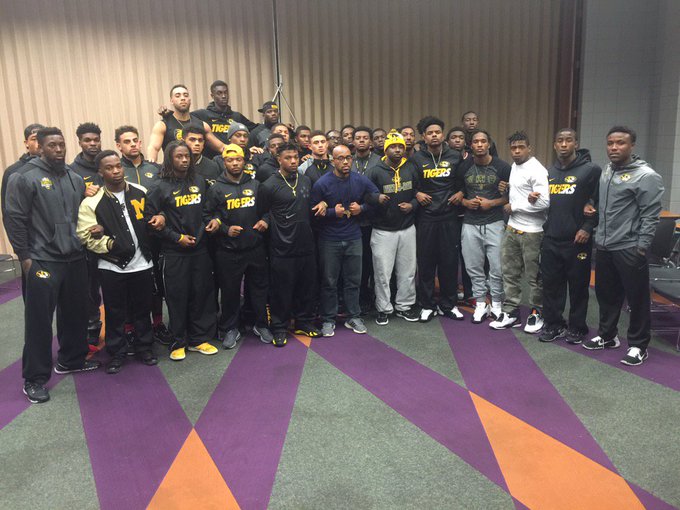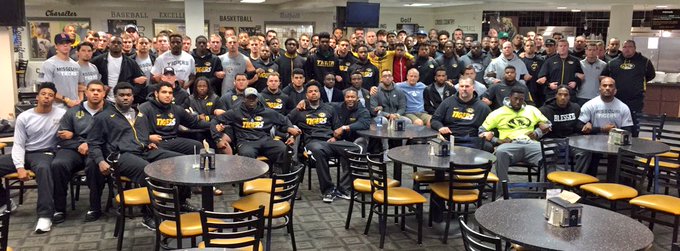A graduate student at the University of Missouri went on a hunger strike for seven days in protest of the university’s handling of a series of racist incidents on its Columbia campus.
Jonathan L. Butler announced in a letter to the university community he “will not consume any food or nutritional sustenance at the expense of my health” until the university’s president, Tim Wolfe, is removed from office.
Wolfe resigned Monday morning after protests grew.
Butler, 25, wrote, “Mizzou’s deteriorating culture is like a gaping and infected wound that can only be cured by scraping out the dead and decaying flesh and starting anew with a flushing of the skin and application of proper antibiotics to begin the healing process. In this scenario, Tim Wolfe is the decaying flesh and the longer he stays in leadership of the UM system the worst the campus climate will become.”
Butler and a group called Concerned Student 1950 (a reference to the first year black students were accepted by the 176-year-old university) began protesting in September, when the Students Association President said he was called a racial slur by men in a pickup truck on campus. Then, on October 5, a drunk student made racial slurs while the Legion of Black Collegians rehearsed a homecoming skit. And on October 24, a student made a swastika out of human feces on the floor and wall of a dormitory.
Here’s what you need to know about Jonathan Butler and the situation at the University of Missouri:
1. He Said He Would Continue the Hunger Strike Until His ‘Life Is Lost’ if Necessary
Butler said in his letter announcing his hunger strike that he would not eat food or any other nutritional supplement until either Wolfe is removed from office or, until his “internal organs fail and my life is lost. Being of sound mind and heart, I have committed myself fully to this endeavor because I believe that the University of Missouri system and all of its constituents deserve a leader who is competent enough to perform at all levels of the position, including administrative, political, financial and emotional.”
Butler, who is pursuing his master’s degree in educational leadership and policy analysis and has become an activist on campus, said he put his life in “God’s hands.”
He met twice with Wolfe, once before and once during the hunger strike. He says he has “no ill will or thoughts of harm” toward the president, but says, “I do have an urgency to make the campus I call home a more safe, welcoming, and inclusive environment for all identities and backgrounds.”
Wolfe said in a statement on November 3, one day into Butler’s hunger strike:
It is very concerning to me when any of our students’ wellbeing is in jeopardy, and I am especially concerned about the health and safety of MU student Jonathan Butler. Jonathan is a valued and effective voice in our struggle to combat racial injustice.
When I heard that Jonathan was participating in a hunger strike, I contacted him directly that day and expressed my concern for him. I also indicated my desire to have additional meetings with him and the ConcernedStudent1950 group, beyond the initial meeting we had on October 26. The only way we can begin to address the systemic and pervasive issue of racism in society and the effects it has on our campuses is to engage in dialogue, to build deeper relationships and have frank conversations. From these conversations, we must make changes in policy that ensures that our campuses promote a culture of respect.
He then issued a second statement on November 6:
I am very concerned about Jonathan’s health. His voice for social justice is important and powerful. He is being heard and I am listening. I am thankful for the leadership provided by him and the other student leaders in raising awareness of racism, injustice, and intolerance. This afternoon I also met with representatives of several student groups and I value their input and hear their voices.
Racism does exist at our university and it is unacceptable. It is a long-standing, systemic problem which daily affects our family of students, faculty and staff. I am sorry this is the case. I truly want all members of our university community to feel included, valued and safe.
2. He & Other Protesters Confronted Wolfe at the University’s Homecoming Parade
Butler and other protesters confronted Wolfe at the university’s homecoming parade on October 10. Video of the protest can be seen above.
About a month later, Wolfe finally responded with an apology, saying, “I regret my reaction at the MU homecoming parade when the ConcernedStudent1950 group approached my car. I am sorry, and my apology is long overdue. My behavior seemed like I did not care. That was not my intention. I was caught off guard in that moment. Nonetheless, had I gotten out of the car to acknowledge the students and talk with them perhaps we wouldn’t be where we are today. I am asking us to move forward in addressing the racism that exists at our university – and it does exist. Together we must rise to the challenge of combatting racism, injustice, and intolerance.”
3. Wolfe Said Stepping Down Was the Right Thing to Do
Wolfe said Monday that stepping down is the right thing to do. He said he hopes the resignation will help the campus heal.
On Sunday, November 8, Wolfe issued another statement, but did not indicate any plans to resign.
“It is clear to all of us that change is needed, and we appreciate the thoughtfulness and passion which have gone into the sharing of concerns,” Wolfe said. “My administration has been meeting around the clock and has been doing a tremendous amount of reflection on how to address these complex matters. Clearly, we are open to listening to all sides, and are confident that we can come together to improve the student experience on our campuses. We want to find the best way to get everyone around the table and create the safe space for a meaningful conversation that promotes change. We will share next steps as soon as they are confirmed.”
Wolfe added that the university has already began work on a “systemwide diversity and inclusion strategy, plan and metrics for the University System,” as part of his strategic goals approved in the summer.
“Our due date for announcing the strategy was April 2016, having allowed for multiple stakeholders (e.g., faculty, staff, students, consultants) across the system to provide input into the plan,” Wolfe said.
Concerned Student 1950 has issued a list of demands:
Wolfe said Sunday, “The majority of items listed on the Concerned Student 1950 List of Demands were already included in the draft of the strategy. While the student list provides more detail and more specific metrics than had been established in the UM System plan, we had anticipated providing specificity and detail to the plan over the coming months.
“In the meantime, I am dedicated to ongoing dialogue to address these very complex, societal issues as they affect our campus community,” Wolfe said.
Students at the University of Missouri have grown frustrated with the response to their outrage at the racial incidents on campus. Several protests calling for Wolfe’s resignation or firing have been organized on campus. Anger with Wolfe grew Friday night, when he spoke with students in Kansas City.
The interaction was recorded on video (which you can watch below). It starts after the students asked him a question, and he replies, “I will give you an answer, and I’m sure it will be a wrong answer.”
He then told the students, “Systematic oppression is because you don’t believe that you have the equal opportunity for success,” and then walked away as the students reacted negatively.
“Did you just blame us for systematic oppression, Tim Wolfe?,” one student screamed after him.
4. The Efforts of Butler & Other Students Gained a Bigger Spotlight From the Football Team’s Boycott
The spotlight on Wolfe, Butler’s hunger strike and the racist incidents at Missouri was turned up Saturday night when more than 30 black members of the university’s football team announced they would be boycotting all football-related activities until Wolfe is fired or resigns.
The football players said in a statement posted on social media, “The athletes of color on the University of Missouri football team truly believe ‘Injustice Anywhere is a threat to Justice Everywhere’ We will no longer participate in any football related activities until Tim Wolfe resigns or is removed due to his negligence toward marginalized student’ experiences. WE ARE UNITED!!!!!”
The team’s head coach, Gary Pinkel, and white members of the football team said Sunday morning they are supporting the striking players.
The athletic department announced Sunday night that the team will not practice again until Butler’s hunger strike has ended.
5. Butler Earned His Undergrad Degree From Missouri & Runs a Company Combating Human Trafficking
Butler, who was born and raised in Omaha, Nebraska, has an undergraduate degree from the University of Missouri, according to his LinkedIn page.
He founded a not-for-profit photography company to combat human trafficking. He has also worked as a graduate research assistant and student instructor at Missouri.

